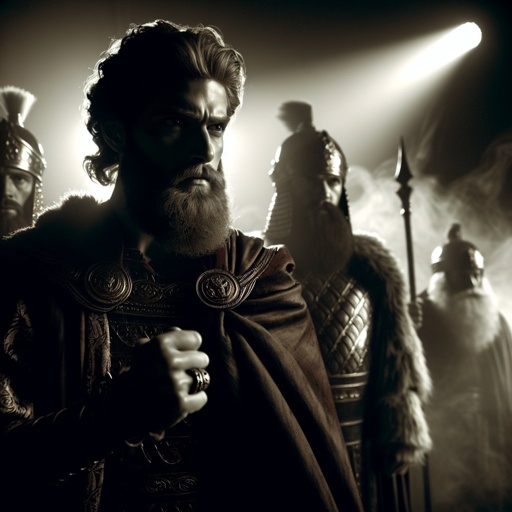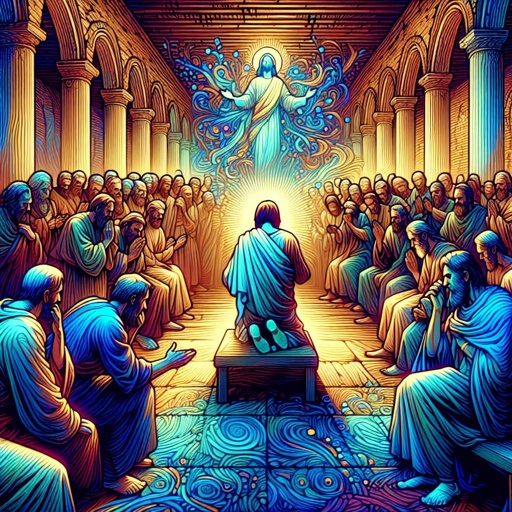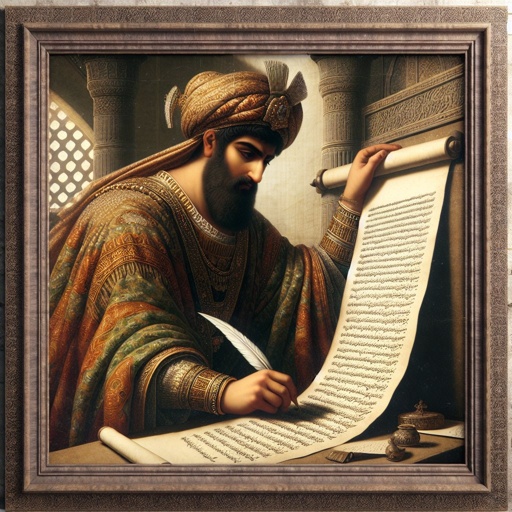What does Daniel 6:20 mean?
"And when he came to the den, he cried with a lamentable voice unto Daniel: and the king spake and said to Daniel, O Daniel, servant of the living God, is thy God, whom thou servest continually, able to deliver thee from the lions?" - Daniel 6:20

Daniel 6:20 - "And when he came to the den, he cried with a lamentable voice unto Daniel: and the king spake and said to Daniel, O Daniel, servant of the living God, is thy God, whom thou servest continually, able to deliver thee from the lions?"
Daniel 6:20 (KJV) states, "And when he came to the den, he cried with a lamentable voice unto Daniel: and the king spake and said to Daniel, O Daniel, servant of the living God, is thy God, whom thou servest continually, able to deliver thee from the lions?"
This verse comes from the book of Daniel in the Old Testament. The book of Daniel is a collection of stories and visions that follow the life of Daniel, a Jewish exile in Babylon. These stories are set during the time of the Babylonian exile, and they offer a unique perspective on faith, prophecy, and the sovereignty of God. In this particular verse, we see a dramatic moment in which Daniel is thrown into a den of lions as punishment for his faithfulness to God.
The context of this verse is crucial to understanding its meaning. The story leading up to this point in Daniel 6 tells us that Daniel was a man of great faith and integrity who served as an administrator in the kingdom of Darius the Mede. His wisdom and competence had gained him favor with the king, much to the envy of the other administrators and high officials who sought to find grounds for charges against him. These men manipulated the king into issuing a decree that anyone who prayed to anyone besides the king would be thrown into the lions' den.
Despite this decree, Daniel continued to pray to God three times a day as he had done before. When his enemies caught him in the act, they reported him to the king, who reluctantly ordered Daniel to be thrown into the den of lions. The king, who admired and respected Daniel, was grieved by his decision but was bound by the law he had enacted.
The verse in question captures the moment when the king, filled with anxiety and remorse, calls out to Daniel at the lions' den. His cry reflects his desperation and uncertainty about the fate of his beloved servant. The king's question to Daniel, "Is thy God, whom thou servest continually, able to deliver thee from the lions?" demonstrates his deep respect for Daniel's unwavering faith and his hope that God would somehow rescue him from this perilous situation.
This verse touches on several themes that are central to the book of Daniel and the larger biblical narrative. One of the most prominent themes is the sovereignty of God. Throughout the book, we see that God's power and authority supersede that of earthly kingdoms and rulers. In this verse, the king's question implicitly acknowledges the power of Daniel's God and his ability to deliver his faithful servant from harm. This theme highlights the unwavering faith and trust in God displayed by Daniel, even in the face of persecution and mortal danger.
Another important theme in this verse is the concept of divine deliverance. The king's question reflects a common motif in the Bible, where God's intervention saves his people from seemingly impossible situations. This theme is echoed in numerous other stories in the Bible, such as the Exodus, the rescue of Shadrach, Meshach, and Abednego from the fiery furnace, and the deliverance of Peter from prison in the New Testament. These stories serve as powerful reminders of God's faithfulness and his ability to rescue his people from harm.
Additionally, the verse highlights the character of Daniel as a faithful and obedient servant of God. His steadfast devotion to God, even in the face of opposition and persecution, serves as an example of unwavering faith and commitment. This theme of faithfulness and obedience to God despite adversity is a recurring motif in the book of Daniel and serves as an encouragement to believers facing similar challenges.
Symbolically, the den of lions can be interpreted as a representation of the trials and tribulations that believers may face in their lives. Just as Daniel was thrown into a den of ferocious lions, believers may find themselves in situations that seem overwhelming and perilous. However, the story of Daniel serves as a reminder that God is able to deliver his people from even the most terrifying circumstances.
In conclusion, Daniel 6:20 (KJV) holds deep significance within the broader context of the book of Daniel and the biblical narrative as a whole. It portrays the unwavering faith of Daniel, the sovereignty and deliverance of God, and the theme of obedience in the face of adversity. This verse serves as a powerful reminder of God's faithfulness and his ability to rescue his people from danger, even in the most dire of circumstances.
Daniel 6:20 Artwork

Daniel 6:20 - "And when he came to the den, he cried with a lamentable voice unto Daniel: and the king spake and said to Daniel, O Daniel, servant of the living God, is thy God, whom thou servest continually, able to deliver thee from the lions?"

Daniel 6:28 - "So this Daniel prospered in the reign of Darius, and in the reign of Cyrus the Persian."

Daniel 6:21 - "Then said Daniel unto the king, O king, live for ever."

Daniel 2:20 - "Daniel answered and said, Blessed be the name of God for ever and ever: for wisdom and might are his:"

Daniel 1:6 - "Now among these were of the children of Judah, Daniel, Hananiah, Mishael, and Azariah:"

Nehemiah 10:6 - "Daniel, Ginnethon, Baruch,"

Daniel 6:11 - "Then these men assembled, and found Daniel praying and making supplication before his God."

Daniel 6:3-4 - "Daniel 6:3-4: Then this Daniel was preferred above the presidents and princes, because an excellent spirit was in him; and the king thought to set him over the whole realm. So the presidents and princes sought to find occasion against Daniel concerning the kingdom; but they could find none occasion nor fault; forasmuch as he was faithful, neither was there any error or fault found in him."

Daniel 6:16 - "Then the king commanded, and they brought Daniel, and cast him into the den of lions. Now the king spake and said unto Daniel, Thy God whom thou servest continually, he will deliver thee."

Daniel 6:9 - "Wherefore king Darius signed the writing and the decree."

Daniel 6:2 - "And over these three presidents; of whom Daniel was first: that the princes might give accounts unto them, and the king should have no damage."

Daniel 6:27 - "He delivereth and rescueth, and he worketh signs and wonders in heaven and in earth, who hath delivered Daniel from the power of the lions."

Daniel 6:3 - "Then this Daniel was preferred above the presidents and princes, because an excellent spirit was in him; and the king thought to set him over the whole realm."

Daniel 6:5 - "Then said these men, We shall not find any occasion against this Daniel, except we find it against him concerning the law of his God."

Daniel 8:20 - "The ram which thou sawest having two horns are the kings of Media and Persia."

Daniel 6:6 - "Then these presidents and princes assembled together to the king, and said thus unto him, King Darius, live for ever."

Daniel 6:23 - "Then was the king exceeding glad for him, and commanded that they should take Daniel up out of the den. So Daniel was taken up out of the den, and no manner of hurt was found upon him, because he believed in his God."

Daniel 6:17 - "And a stone was brought, and laid upon the mouth of the den; and the king sealed it with his own signet, and with the signet of his lords; that the purpose might not be changed concerning Daniel."

Daniel 6:22 – "My God sent his angel, and he shut the mouths of the lions."

Daniel 6:22 – "My God sent his angel, and he shut the mouths of the lions."

Daniel 6:22 – "My God sent his angel, and he shut the mouths of the lions."

Daniel 6:14 - "Then the king, when he heard these words, was sore displeased with himself, and set his heart on Daniel to deliver him: and he laboured till the going down of the sun to deliver him."

Ezekiel 14:20 - "Though Noah, Daniel, and Job, were in it, as I live, saith the Lord GOD, they shall deliver neither son nor daughter; they shall but deliver their own souls by their righteousness."

Daniel 6:19 - "Then the king arose very early in the morning, and went in haste unto the den of lions."

Daniel 6:13 - "Then answered they and said before the king, That Daniel, which is of the children of the captivity of Judah, regardeth not thee, O king, nor the decree that thou hast signed, but maketh his petition three times a day."

Daniel 6:4 - "¶ Then the presidents and princes sought to find occasion against Daniel concerning the kingdom; but they could find none occasion nor fault; forasmuch as he was faithful, neither was there any error or fault found in him."

Daniel 4:20 - "The tree that thou sawest, which grew, and was strong, whose height reached unto the heaven, and the sight thereof to all the earth;"

Daniel 3:6 - "And whoso falleth not down and worshippeth shall the same hour be cast into the midst of a burning fiery furnace."

Daniel 6:1 - "It pleased Darius to set over the kingdom an hundred and twenty princes, which should be over the whole kingdom;"

Daniel 3:20 - "And he commanded the most mighty men that were in his army to bind Shadrach, Meshach, and Abed-nego, and to cast them into the burning fiery furnace."